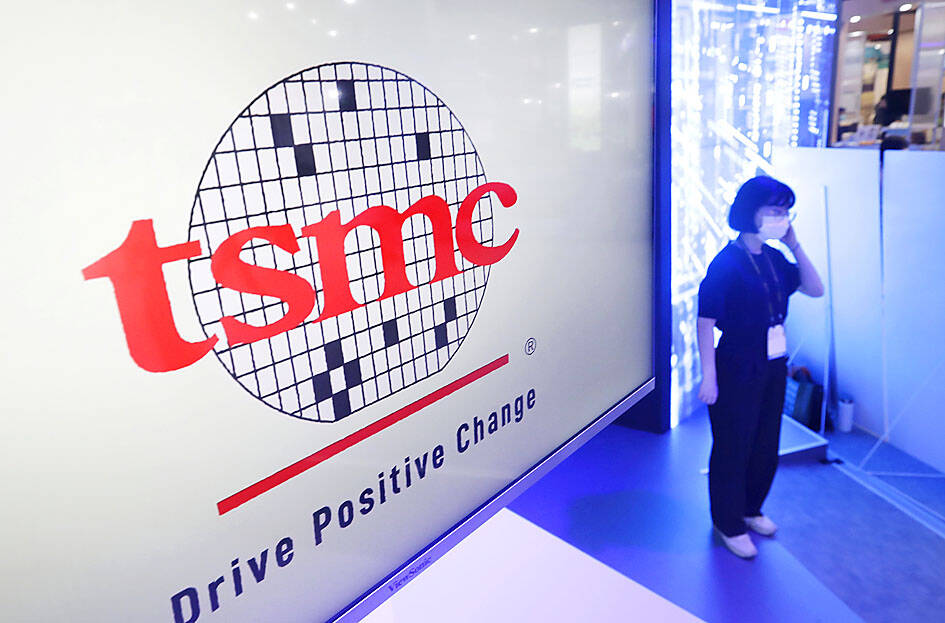One of China’s most promising chip designers has already navigated through export restrictions implemented by US President Joe Biden’s administration and concluded it would be able to continue tapping Taiwan Semiconductor Manufacturing Co (TSMC, 台積電) to produce its advanced silicon.
Shanghai-based Biren Intelligent Technology (壁仞科技) develops artificial intelligence (AI) chips and is considered a promising domestic contender to compete with graphics chips from Nvidia Corp, which has said it can no longer sell its most advanced AI products in China.
The US measures were designed to limit China’s development of technology that could be used in aid of its military, and appeared to rule out access to advanced fabrication, but Biren believes its AI chips produced by TSMC are not covered by the sanctions, people with direct knowledge of the matter said.

Photo: AP
Biren, founded in 2019, made bold claims in the summer about its chips outperforming Nvidia’s market-leading A100 AI accelerator — the product that can no longer be sold in China.
However, after reviewing the designs, TSMC and Biren concluded that the specifications of the Chinese chip do not meet the criteria for restriction, according to one of the people, who asked not to be named.
It suggests that Washington’s controls might not be a catch-all for alternatives to Nvidia’s hardware.
“Biren has a chip fortunately just below the threshold and the chip hence can still be made by TSMC,” Sanford C. Bernstein analysts led by Mark Li wrote in a report that analyzed chips against the US export control.
TSMC, the world’s largest contract chipmaker, complies with all relevant rules and regulations and “will continue to serve all customers around the world,” TSMC chief executive officer C.C. Wei (魏哲家) said in response to a question about China during its earnings call last week.
Biren believes everything it is doing complies with legal regulations, according to one of the people. TSMC is reviewing products from other Chinese chip developers to see whether it can continue their production under the new export controls, another person said.
Bernstein’s Li saw limited revenue exposure for TSMC from the new controls, stressing that “only very high-end computer chips are restricted,” and estimating a hit of 0.4 percent to the company’s sales next year.
While Biren can continue building its current generation of semiconductors, Washington’s curbs are likely to effectively cap its progress up the technology ladder. Additional improvements from Biren are liable to fall foul of the high-performance silicon restriction.
Biren, backed by the likes of venture firms IDG Capital and Walden International, was seeking new funds earlier this year at a valuation of US$2.7 billion, Bloomberg News reported.
Its flagship BR100 and BR104 processors are designed along similar lines to the graphics chips that Nvidia and Advanced Micro Devices Inc have adapted to AI purposes, and can be used to train artificial intelligence models and algorithms that include computer vision, natural language processing and conversational AI.

With an approval rating of just two percent, Peruvian President Dina Boluarte might be the world’s most unpopular leader, according to pollsters. Protests greeted her rise to power 29 months ago, and have marked her entire term — joined by assorted scandals, investigations, controversies and a surge in gang violence. The 63-year-old is the target of a dozen probes, including for her alleged failure to declare gifts of luxury jewels and watches, a scandal inevitably dubbed “Rolexgate.” She is also under the microscope for a two-week undeclared absence for nose surgery — which she insists was medical, not cosmetic — and is

CAUTIOUS RECOVERY: While the manufacturing sector returned to growth amid the US-China trade truce, firms remain wary as uncertainty clouds the outlook, the CIER said The local manufacturing sector returned to expansion last month, as the official purchasing managers’ index (PMI) rose 2.1 points to 51.0, driven by a temporary easing in US-China trade tensions, the Chung-Hua Institution for Economic Research (CIER, 中華經濟研究院) said yesterday. The PMI gauges the health of the manufacturing industry, with readings above 50 indicating expansion and those below 50 signaling contraction. “Firms are not as pessimistic as they were in April, but they remain far from optimistic,” CIER president Lien Hsien-ming (連賢明) said at a news conference. The full impact of US tariff decisions is unlikely to become clear until later this month

GROWING CONCERN: Some senior Trump administration officials opposed the UAE expansion over fears that another TSMC project could jeopardize its US investment Taiwan Semiconductor Manufacturing Co (TSMC, 台積電) is evaluating building an advanced production facility in the United Arab Emirates (UAE) and has discussed the possibility with officials in US President Donald Trump’s administration, people familiar with the matter said, in a potentially major bet on the Middle East that would only come to fruition with Washington’s approval. The company has had multiple meetings in the past few months with US Special Envoy to the Middle East Steve Witkoff and officials from MGX, an influential investment vehicle overseen by the UAE president’s brother, the people said. The conversations are a continuation of talks that

CHIP DUTIES: TSMC said it voiced its concerns to Washington about tariffs, telling the US commerce department that it wants ‘fair treatment’ to protect its competitiveness Taiwan Semiconductor Manufacturing Co (TSMC, 台積電) yesterday reiterated robust business prospects for this year as strong artificial intelligence (AI) chip demand from Nvidia Corp and other customers would absorb the impacts of US tariffs. “The impact of tariffs would be indirect, as the custom tax is the importers’ responsibility, not the exporters,” TSMC chairman and chief executive officer C.C. Wei (魏哲家) said at the chipmaker’s annual shareholders’ meeting in Hsinchu City. TSMC’s business could be affected if people become reluctant to buy electronics due to inflated prices, Wei said. In addition, the chipmaker has voiced its concern to the US Department of Commerce